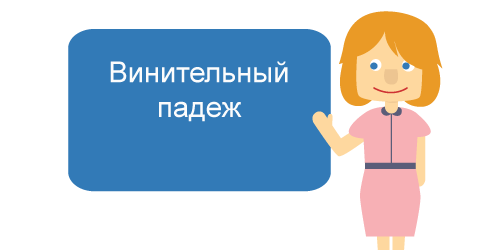
Russian cases
Free course to learn all Russian cases
Lesson 2:
Accusative - Part 2
The accusative case of animate nouns
!! This course requires basic knowledge of Russian. If this is not your case, we recommend you our Basic Russian Course.

Introduction to the accusative case
When is the accusative case used?
Generally, we use the accusative case...
- to express the direct object: Я ви́жу мою́ кни́гу - I see my book.
- after some prepositions to show the place "someone goes to": Мы идём в кино́ - We are going to the cinema.
What will we learn in this lesson?
We are going to learn the accusative case of different animate nouns (that is, names of people and animals). We will also learn the accusative of pronouns.

Russian vocabulary
Read, listen and repeat the vocabulary of this lesson:
If you still don't know how to read the Cyrillic alphabet, visit our course on how to read Russian.
вини́тельный паде́ж
Accusative (Acc.)
ра́ньше
before
ко́шка
cat
соба́ка
dog
секре́т
secret
вме́сте
together
не мо́жет быть
it can't be / no way
актёр
actor
актри́са
actress

Dialogues in Russian
Read, listen and pay attention to the cases used
Extra help: highlighted cases + tables
We have highlighted the words in accusative. You can also look up these grammar tables while you read the dialogues:
These tables will open in a new window
Dialogue 1
Хо́чешь смотре́ть на́ши фотогра́фии?
Do you want see our photographs?
Коне́чно! Кто э́то?
Of course! Who is this?
Э́то мой друг. Его́ зову́т Пётр. Ты зна́ешь моего́ дру́га?
This is my (male) friend. His name is Piotr (they call him Piotr). Do you know my friend?
Да, я его зна́ю. Он лю́бит пи́ццу и пьёт то́лько во́ду.
Yes, I know him. He loves pizza and drinks only water.
Ты прав. А э́то моя́ подру́га. Её зову́т О́льга. Ты зна́ешь мою́ подру́гу?
You are right. And this is my (female) friend. Her name is Olga (they call her Olga). Do you know my friend?
Я ду́маю, что я её зна́ю. Она́ всегда́ пьёт чай, пра́вда?
I think I know her. She always drinks tea, right?
Да, да, э́то она́. А э́то мои́ роди́тели. Ты зна́ешь мои́х роди́телей?
Yes, that's her. And these are my parents. Do you know my parents?
Да, я их зна́ю. Кста́ти, вчера́ я ви́дел твоего́ отца́ и его́ дру́га. Они́ пи́ли ко́фе.
Yes, I know them. By the way, yesterday I saw your father and his friend. They were drinking coffee.
Dialogue 2
Хо́чешь знать секре́т? Я люблю́ твою́ сестру́.
Do you want to know a secret? I love your sister.
Не мо́жет быть! Но Ма́йкл, я ду́мала что ты лю́бишь мою́ подру́гу Ка́тю.
No way! But Michael, I thought you loved my friend Katya.
Ка́тю? Коне́чно нет! Ка́тя лю́бит моего́ дру́га. Я ви́дел их вме́сте.
Katya? Of course not! Katya loves my friend. I saw them together.
Ого́! Я ду́мала, что Ка́тя лю́бит твоего́ бра́та! Ра́ньше она́ люби́ла твоего́ бра́та, а сейча́с лю́бит твоего́ дру́га?
Wow! I thought that Katya loved your brother! Before she loved your brother and now she loves your friend?
Да, да. А твоя́ сестра́? Она́ лю́бит меня́?
Yes. And your sister? Does she love me?
Не зна́ю... Я ду́маю, моя́ сестра́ лю́бит то́лько твою́ соба́ку.
I don't know... I think that my sister only loves your dog.
Э́то пробле́ма... Моя́ соба́ка не лю́бит её ко́шку.
That's a problem... my dog doesn't love her cat.
Dialogue 3
We have added here some adjectives in accusative (highlighted in other colour). In lesson 3 you will learn about them.
Вчера́ я была́ в кино́. Я смотре́ла но́вый фильм.
Yesterday I went to the cinema. I watched a new movie.
Пра́вда? Все мои́ друзья́ там бы́ли! Ты ви́дела мои́х друзе́й?
Really? All my friends were there! You saw my friends?
Я не зна́ю твои́х друзе́й. Но я ви́дела твои́х бра́тьев и сестёр.
I don't know your friends. But I saw your brothers and sisters.
И как фильм? Ты ви́дела мои́х люби́мых актёров?
And how was the movie? Did you see my favourite actors?
Нет, но я ви́дела о́чень краси́вых актри́с: Джу́лию Ро́бертс и Ка́мерон Ди́ас.
No, but I saw very beautiful actresses: Julia Roberts and Cameron Diaz.
Я не люблю́ э́тих актри́с.
I don't love these actresses.
Я то́же их не люблю́. Но э́то хоро́ший фильм.
I don't love them either. But this is a good movie.
Do you want to learn Russian with the best courses and books?
We recommend you the best Russian course, with 160 videos and personal tutor.
If you love reading, have a look at these books with stories in easy Russian with audio.
If you want to practice your Russian, here you can find exercise books, with key and grammar tables.

Russian grammar
Read the following grammar summary. We will learn the cases from this lesson.
The Accusative Case: Animate nouns
In this lesson's dialogues we have seen examples of Nominative (Nom.) and Accusative (Acc.) Case in animate nouns (that is, names of people and animals. These are the most important points to remember about these two Cases:
Animate nouns in singular
- Accusative masculine = Genitive masculine.
- Feminine: its endings are unique to Accusative.
We have highlighted the endings in the tables for each gender.
Masculine: -а -я>
- Э́то мой брат (Nom.). Я ви́жу моего́ бра́та (Acc.)
This is my brother. I see my brother.
Feminine: -у -ю
- Э́то моя́ соба́ка (Nom). Я ви́жу мою́ соба́ку (Acc.)
This is my dog. I see my dog.
Neuter
- There are very few animate neuter nouns. That is why we are not mentioning their rules in this course.
Animate nouns in plural
- Accusative = Genitive (for all genders)
We have highlighted the endings in the tables for each gender.
Masculine: -ов -ев -ей
- Э́то мои́ бра́тья (Nom) Я ви́жу мои́х бра́тьев (Acc.)
These are my brothers. I see my brothers.
Feminine: -... -ь -ий -ей
- Э́то мои́ соба́ки (Nom). Я ви́жу мои́х соба́к (Acc.)
These are my dogs. I see my dogs.
Neuter
- There are very few animate neuter nouns. That is why we are not mentioning their rules in this course.

Test
Check how much you have learnt in this lesson:
This Russian course will always be free. Please, share it
When you share our website, you're helping us continue with our project: developing free Russian courses for everyone. Please, invest some seconds of your time in sharing us. Thank you.
|
Contact us Site map Terms of use Privacy policy Shop - Russian school Copyright © www.russianforfree.com All rights reserved. |


